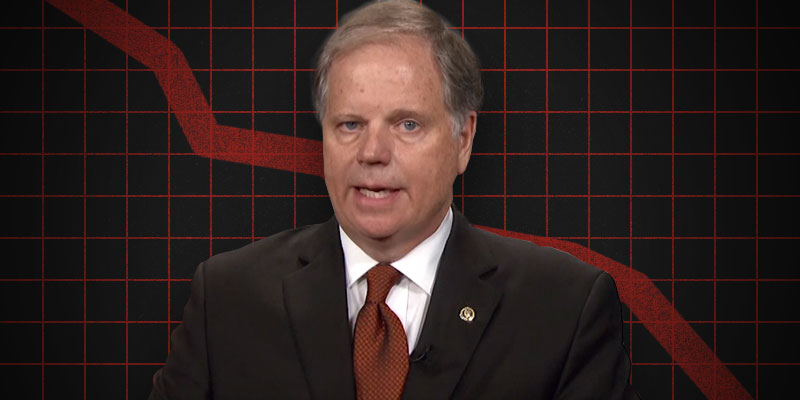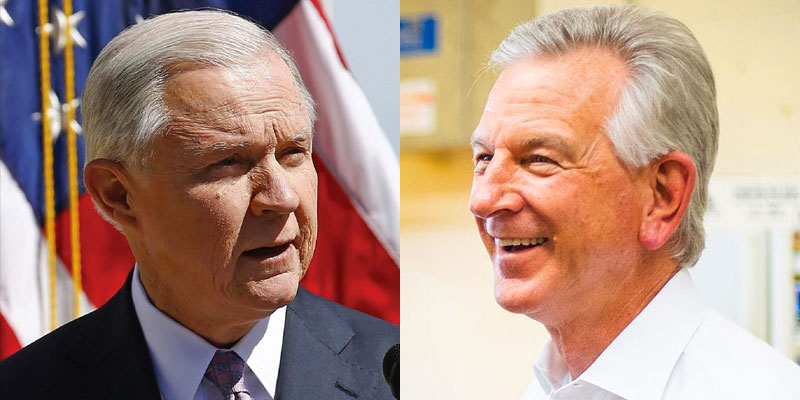A new poll released Tuesday morning by a non-partisan national research firm confirms that Sen. Doug Jones (D-AL) is facing nearly impossible demographic barriers to re-election.
The poll by Mason-Dixon Polling & Strategy, which has offices in Washington, D.C. and Jacksonville, FL, was conducted April 9-11 and surveyed 625 registered Alabama voters by telephone. The margin of error is four percent.
While the survey surprisingly found Jones to hold a positive net job approval rating of one point (45 percent approved and 44 percent disapproved), his re-elect numbers went sharply downhill from there.
Overall, 50 percent are set on replacing Jones, while 40 percent want to re-elect him. Yet, demographic breakdowns foreshadow a rough 2020 general election for the Democrat, especially with President Donald Trump up for re-election.
Men answered by a margin of 59-34 percent that they want to replace Jones, while women said 46-42 percent that they would re-elect him.
Jones is underwater with both people under and over the age of 50. The more reliable, older voting group would replace him 54-37 percent. His job approval rating was actually worse than his re-elect numbers in this older group, which disapproved by 55-36 percent.
Then, when it comes to race, white people would replace Jones 70-20 percent while black people would re-elect the junior senator from Mountain Brook by 84-5 percent. Only 27 percent of white people approved of Jones’ job performance.
This key demographic statistic potentially bodes worst for Jones, as the survey was the best case scenario for him considering it was weighted to account for 64 percent of voters being white and 29 percent being black, while an estimated 74 percent of Alabama voters were white and 24 percent black in the 2016 general election.
Independents would replace Jones 49-35 percent.
In a statement to Yellowhammer News, renowned pollster and consultant Jim McLaughlin said, “In the general election, it tells you what many of us have expected, Doug Jones is done, and this is with no one having laid a glove on him and a very friendly mainstream press.”
… ‘Unless Roy Moore’
However, the one possibility that could still save Jones’ hide – the specter of Roy Moore being the Republican nominee again – was also polled. Mason-Dixon’s polling conclusion warned, “Jones’s re-election chances will be affected by who he draws as his Republican challenger in 2020.”
The survey separately tested a hypothetical Republican primary ballot between Moore, Reps. Bradley Byrne (AL-01), Mo Brooks (AL-05) and Gary Palmer (AL-06), Senate President Pro Tem Del Marsh (R-Anniston) and former gubernatorial candidate Tim James. Former Auburn University head football coach Tommy Tuberville was not included.
Moore led the primary ballot with 27 percent of the vote, trailed by Brooks at 18 percent, Byrne at 13 percent, Palmer at 11 percent, Marsh at 4 percent and James at 2 percent, while 25 percent were undecided.
Adding a name recognition question to that information tells the whole story. Moore essentially has maximized that metric, with only 4 percent (within the margin of error of zero) not recognizing his name. He only has a five percent net favorability rating, at 34-29 percent. In contrast, his potential opponents (Byrne is the only one polled that has actually announced) have a lot of room to grow in name recognition while not having the baggage and set ceiling that Moore does.
Byrne’s 23 percent was the highest net favorability at 25-2 percent, followed by Brooks’ 19 percent (27-8), Palmer’s 17 percent (18-1), James’ 12 percent (13-1) and Marsh’s 8 percent (15-7).
Again considering only 4 percent did not recognize Moore’s name, note that 23 percent had never heard of Brooks, 46 percent Byrne, 53 percent Palmer, 57 percent Marsh and 70 percent James. A factor at play here is that Brooks, like Moore, ran in the 2017 Senate special election primary. Byrne’s high net favorability while having so much room for growth in name recognition is very much an encouraging sign for his campaign.
McLaughlin advised, “I wouldn’t feel good if I were Roy Moore in the primary. Yes, at first blush he is the leader with 27%, but he has almost full name recognition with the voters, and he seems to be capped out at a quarter of the vote. Moore is what I would call the pseudo incumbent in the primary, and we have a saying: usually what the incumbent’s got, that’s all they are going to get. Moore has high negatives among the primary voters (29%), whereas the other candidates have a lot more room to grow and have virtually no negatives.”
McLaughlin, president and partner of McLaughlin & Associates, is considered the “gold-standard” when it comes to political polling, strategy and public opinion surveys. He is a nationally recognized expert, appearing on major network and cable news programs and being quoted in the country’s biggest print publications. The firm was widely accredited for its accurate polling in predicting a 2016 Trump victory while other national pollsters floundered.
McLaughlin concluded, “Bottom line, Jones appears to be a goner against any Republican unless Roy Moore became the nominee, which doesn’t seem likely.”
Sean Ross is a staff writer for Yellowhammer News. You can follow him on Twitter @sean_yhn













